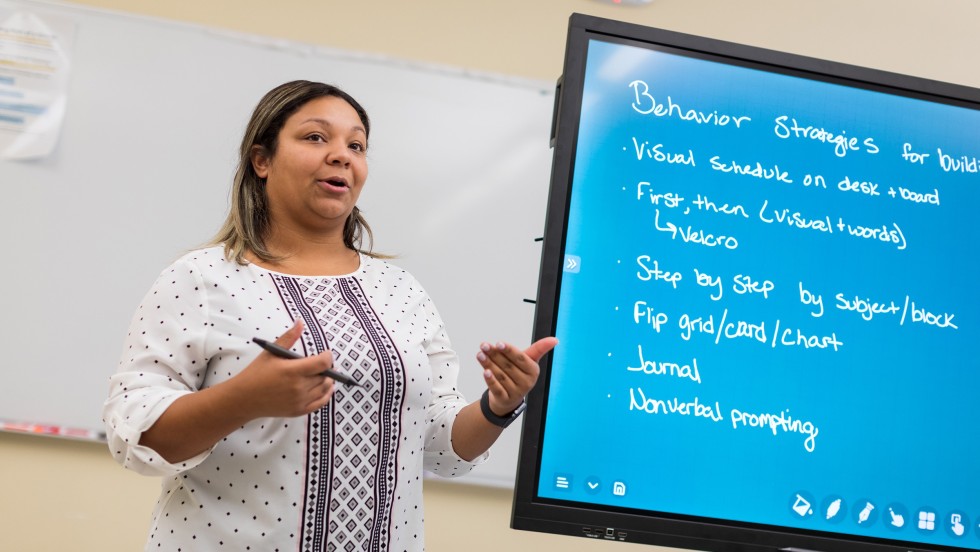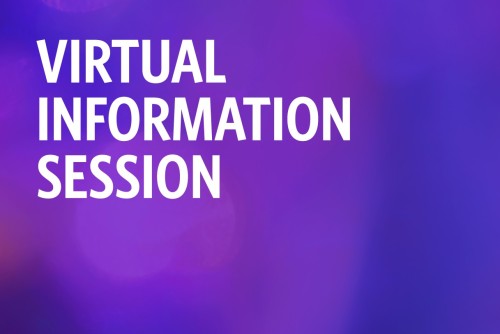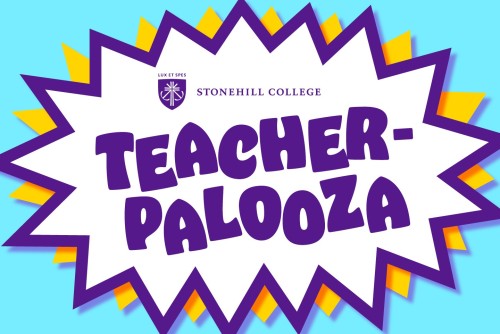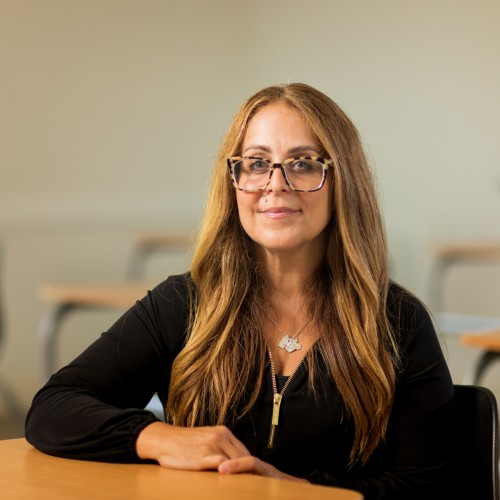Graduate Teacher Education
Stonehill College's graduate teacher education master's degree, postbaccalaureate licensure and graduate certificate programs prepare educators to create and lead inclusive learning environments.
Upcoming Application Deadlines
- Fall Semester: August 1, 2025
- Stonehill in Boston: August 1, 2025
- Stonehill on Cape Cod: August 1, 2025
- Spring Semester: January 1, 2026
- Summer Semester: May 1, 2026
- Stonehill Teacher Residency: May 1, 2026
Graduate Teacher Education at Stonehill
Stonehill College's graduate teacher education programs aim to prepare knowledgeable, reflective, caring and flexible educators who embrace learning, scholarship, community and advocacy in their work. Our teacher preparation curriculum keeps inclusivity central. These programs are designed to foster the skills educators need to address the realities, demands and challenges of the modern classroom while keeping equity, social justice, diversity and accessibility at the center.
Our program tenets include anti-oppressive education, social justice education and democratic education, and we work to reflect these principles in all aspects of our work.
Initial Licensure Options
Stonehill's Master of Education (M.Ed.) in Math/Science, 5-8 prepares teachers to create and lead inclusive learning environments. It leads to a master's degree in education and Massachusetts initial licensure in math/science, 5-8.
Stonehill's Master of Education (M.Ed.) in Special Education, 5-12 prepares teachers to create and lead inclusive learning environments. It leads to a master's degree in education and Massachusetts initial licensure in special education, 5-12.
Stonehill's Master of Education (M.Ed.) in Special Education, PreK-8 prepares teachers to create and lead inclusive learning environments. It leads to a master's degree in education and Massachusetts initial licensure in special education, PreK-8.
Stonehill's Postbaccalaureate Licensure in Math/Science, 5-8 prepares current educators who already hold a master's degree to create and lead inclusive learning environments. It leads to Massachusetts initial licensure in math/science, 5-8.
Stonehill's Postbaccalaureate Licensure in Special Education, 5-12 prepares current educators who already hold a master's degree to create and lead inclusive learning environments. It leads to Massachusetts initial licensure in special education, 5-12.
Stonehill's Postbaccalaureate Licensure in Special Education, PreK-8 prepares current educators who already hold a master's degree to create and lead inclusive learning environments. It leads to Massachusetts initial licensure in special education, PreK-8.
Community Education Specializations
Stonehill's Master of Education (M.Ed.) in Autism prepares educators to support the complex needs of autistic students using democratic education, self-advocacy and social justice as a critical lens in their work. Candidates who qualify with state requirements can also earn the Massachusetts Autism Endorsement for Educator Licensure upon completion of the program.
Stonehill's M.Ed. in Bilingual Education, with or without endorsement, prepares teachers to create and lead inclusive learning environments and provide instruction in a bilingual setting. Candidates who qualify with state requirements can also earn the Massachusetts Bilingual Education Endorsement upon completion of the program.
Stonehill's Master of Education (M.Ed.) in Justice & Anti-Discrimination in Education (JADE) prepares educators who keep justice, anti-discrimination and democratic education at the center of their practice.
Graduate Certificates
Stonehill's Bilingual Education Graduate Certificate, with or without endorsement, prepares teachers to create and lead inclusive learning environments and provide instruction in a bilingual setting. Candidates who qualify with state requirements can also earn the Massachusetts Bilingual Education Endorsement upon completion of the program.
The Justice & Anti-Discrimination in Education (JADE) Graduate Certificate Program prepares educators who keep justice, anti-discrimination and democratic education at the center of their practice.
Finish in 9 to 12 months. This program is offered fully online.
The Understanding Autism Graduate Certificate Program prepares educators to support the complex needs of autistic students using democratic education, self-advocacy and social justice as a critical lens in their work. Candidates who qualify with state requirements can also earn the Massachusetts Autism Endorsement for Educator Licensure upon completion of the program.
Finish in 9 to 12 months. This program is offered fully online.
Partnerships
Stonehill in Boston
Stonehill on Cape Cod
Stonehill College Regional Center for Emergency License Support
Why Stonehill
- Focus on educational equity and diversity helps better prepare educators for the modern classroom
- A core of foundational inclusive education courses ensures our graduates gain the skills to teach all students
- Faculty with well-established expertise in field
- Experiential learning via research, partnership and community opportunities
- Specialized student support framework guides students through program requirements and career preparation
Flexibile Teacher Education Programs to Fit Your Life
There are a variety of ways to pursue your degree, including:
- Part- or full-time
- On- or off-campus
- Late afternoon, evening and weekend courses
- Hybrid options
Upcoming Graduate & Professional Studies Events
-
Virtual Information Sessions
Join us for a virtual information session or drop-in session to learn more about our master’s degree and certificate programs.
-
Teacherpalooza: A Teacher Appreciation Event
Join us Wednesday, June 17, 2026, for Teacherpalooza, a teacher appreciation event hosted by Stonehill Graduate Teacher Education to thank educators for their hard work.
Stonehill's graduate teacher education program challenges us to think differently, beyond the traditional model of school. We're creating ways to keep students in need of specialized instruction in the general education classroom.
Experiential Learning Opportunities
Our graduate teacher education students engage in action research, semester-long project-based learning, intensive residency and research with faculty.
Stonehill has partnerships with several area school districts as well as specialized locations. Residency students can work in diverse settings at our public and private partner sites, including the League School and South Shore Educational Collaborative, among others.
Licensure students complete practica placements at both urban and suburban sites as well as specialized locations. This is an opportunity for students to observe, assist and teach in a range of educational settings. All licensure students are required to complete a field experience or internship.
In courses such as Curricular Innovations & Assistive Technology, students complete a semester-long assistive technology project focused on increasing curricular access.
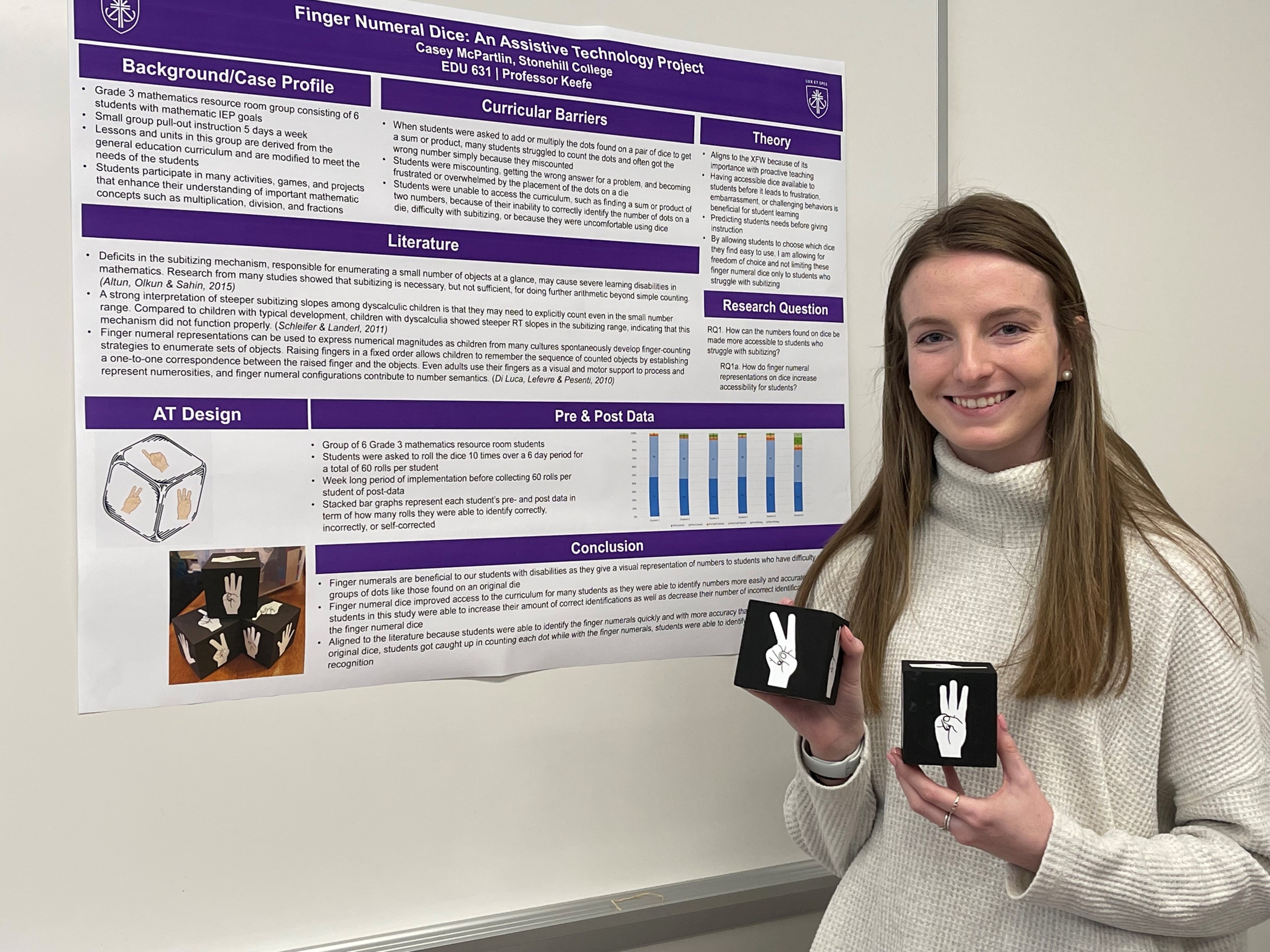
Casey McPartlin '20, M'22 with her assistive technology project Finger Numeral Dice.
Students have the opportunity to work with faculty on research in a variety of areas. In 2019, three students worked with Elizabeth Stringer Keefe to examine the process of the Individualized Education Program (IEP) from the perspective of both parents and educators and presented their findings at the Massachusetts Council for Exceptional Children Annual Conference.
Studying Inclusive Education at Stonehill
Schools today must strive to be inclusive environments, and educators in our program are prepared to be leaders in creating equitable spaces where difference is valued.
Graduate Teacher Education at Stonehill
Stonehill College's graduate teacher education programs aim to prepare knowledgeable, reflective, caring and flexible educators who embrace learning, scholarship, community and advocacy in their work. Social justice and democratic education are at the center of our work and underpins all programs, courses and experiences. We believe education can disrupt systems and processes that perpetuate injustice and inequity and embrace diversity and individuality as strengths.
We advance our mission by modeling the creation of democratic spaces in the graduate classroom that reflect equitable, accessible and inclusive learning environments where students' voices and perspectives help to shape the construction and the provision of their learning.
Three tenets guide our program philosophy:
- Social justice education
- Democratic education
- Anti-oppressive education
Graduate Teacher Education Program Outcomes
Our graduates
- Foster care, connection and community with students, colleagues and families
- Promote inclusivity, diversity and equity in educational spaces
- Work to disrupt systems that perpetuate oppression and inequity
- Embrace teaching practices that foster social justice and democracy
- Lead by making education accessible for all learners
- Elevate student voices and perspectives in education
- Act purposefully to continue to learn and contribute to the profession
Rigorous Academics and the Support to Succeed
Stonehill’s graduate teacher education programs recognize the challenges graduate students face in prioritizing work, family, personal and graduate school commitments. Our Graduate Student Support, Access and Success (SSAS) Framework is designed to support students’ success from program start to finish.
Specifically, this approach provides:
- A proactive vs. reactive framework for supporting graduate students’ variable needs within their program
- Clear benchmarks for assessment of candidate readiness
From the admission process to graduation, students have a clear understanding of both expectations and the support available to help them achieve their goals.
Contact Information
Graduate & Professional Studies Admission assists students as they explore graduate and professional opportunities offered at Stonehill College.



